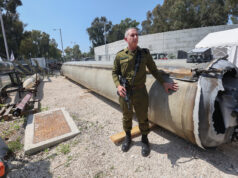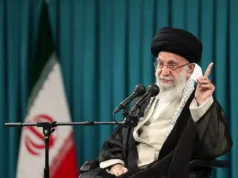Thousands of Iranians on Friday took to the streets to demonstrate against Israel, marching with Palestinian flags and carrying mock coffins decorated with pictures of Israeli leaders. The demonstrators shouted “Death to America, death to Israel” and burned the flags of the two countries in honor of Quds (Jerusalem) Day, an event created in 1979 by Supreme Leader Ayatollah Khomeini and held annually on the last Friday of Ramadan to protest Israel and its sovereignty over Jerusalem.
Unsurprisingly, Iranian President Mahmoud Ahmadinejad, who denied the Holocaust as a Zionist myth in a past Quds Day speech, joined in the anti-Israel chorus. Echoing sentiments expressed recently by Iranian Supreme Leader Ayatollah Khamenei, Ahmadinejad called for the elimination of Israel, referring to the state as “an insult to all humanity“, a “Zionist black stain“, and a “cancerous tumor“. In addition, Hezbollah leader Hassan Nasrallah jumped in on the action, claiming in a televised address that Hezbollah possesses rockets that could kill “tens of thousands” of Israelis and make life in the Jewish state “a real hell“.

On Friday, demonstrators in Tehran burned Israeli and British flags during an annual pro-Palestinian rally marking Quds Day. (Photo: AP) |
Tehran’s threats this year come with new military developments. On Tuesday, Iran unveiled six weapons upgrades including a more accurate short-range missile, and it released plans to launch domestically-manufactured fighter jets and submarines by early 2013. Iran has also recently amassed an arsenal of anti-ship missiles, fast-attack boats, and submarines; more than proven its ability to launch international terrorist attacks using well-armed surrogates; and staged long-range missile tests. All the while, Tehran continues to enrich uranium in the face of sanctions.
Meanwhile, speculation over whether Israel will strike Iran has intensified. An August 14 report in Israeli newspaper Ma’ariv claimed that Prime Minister Benjamin Netanyahu and Defense Minister Ehud Barak have set September 25, the eve of Yom Kippur and the opening day of the UN General Assembly, as the deadline for President Obama to clearly state whether or not the U.S. will take military action against Iran. Barring such a pledge, according to an August 10 Yedioth Ahronoth article, the Israeli duo favor striking Iran before November’s U.S. elections. Indeed, Netanyahu maintains that sanctions and diplomacy have not impacted the progress of Iran’s nuclear program, while Barak says that the “zone of immunity” — when an Israeli strike would no longer be effective in setting back the nuclear program — is quickly nearing.
Though Ahmadinejad and Nasrallah’s Quds Day statements do not substantially differ from those of years past, they must be taken more seriously in the current geopolitical context. At a time in which fear has taken hold, the Iranian and Hezbollah leaders must be taken at their word, which should be as much a call to action for supporters of freedom and the Jewish state as it is meant to be for jihadists and anti-Western forces.





